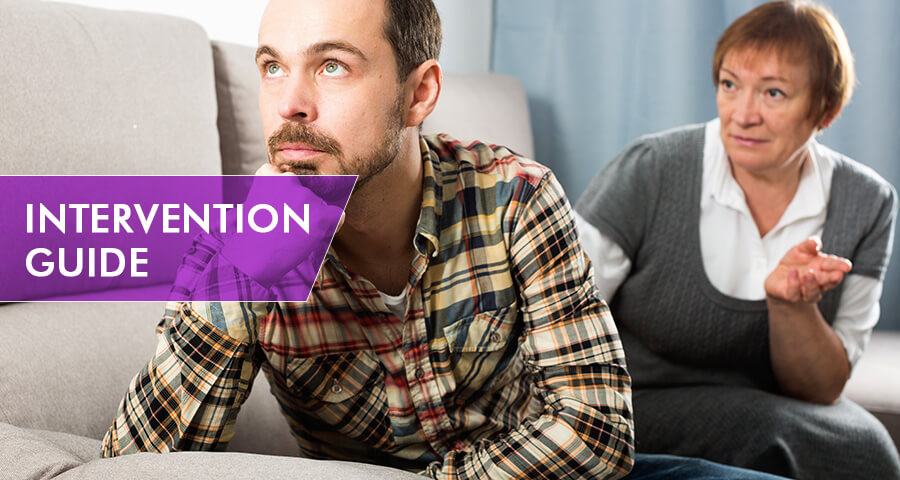
Substance abuse does not only impact heavily on the addict but also their loved ones. It is very difficult for them to want to help and try on multiple occasions but make no progress in setting the individual on the right path. That is why relatives and friends eventually organize a drug or alcohol intervention.
Table Of Contents:
Let’s overview the process: what is an intervention, what are the types, how to do an intervention, how much it costs, and what is an intervention specialist’s role in this process?
What Is an Intervention?
Some people struggling with substance addiction recognize the extent of their problems on their own and seek treatment without the need for a drug or alcohol intervention. Others refuse to accept that they have a problem or that it involves addiction to drugs or alcohol.
So, what is an intervention? It is a psychiatric technique that involves a group of important people in an addict’s life meeting simultaneously to share their thoughts and emotions regarding the substance addiction and its effects with the addict, with the ultimate goal of having them change and seek substance abuse treatment. It is essential to know that a drug or alcohol intervention is not a form of treatment. Drug intervention sessions can provide the critical “push” these individuals need.
During an intervention, the intervention team gathers with the addicted person to outline the negative consequences of addiction and present possible ways to overcome them.
This Team Most Often Consists Of:
- Family
- Close friends or co-workers
- Substance abuse interventionist (alone or with trained addiction counselors)
If an addict is religious, a local church member or a priest may also be called to support the process.
When to Intervene?
When considering how to do an intervention, it is not meant to be the first step in helping someone with substance addiction. If someone close is dealing with drug use, the first step is to bring it up calmly and express the impact the addiction is having on people around the addict.

If the evidence of the addiction is clear yet the person still refuses to get help even when you have had multiple conversations with them, an intervention can then be planned.
An interventionist is a professional who can conduct an intervention, listen to the feelings of both the addict and their loved ones, and find the problem and help construct the path to fixing it.
One of the most devastating myths about drug intervention is that interventions should occur when the addict is at their weakest point. It is a harmful mistake that must be avoided.
Here Are Some Other Myths That One Should Avoid:
- Wait until the patient hits the bottom. When it comes to early intervention, try to get help before things progress very far rather than waiting for a time limit.
- Addicts lack basic morals. Anyone can get addicted to a substance, irrespective of the morals and character they possess.
- Addicts will break the ties with those trying to help. The response of a recovering addict is unpredictable. They do get upset at various instances, but it won’t lead them to break ties. Instead, at some point, they realize that friends and family are only trying to help.
- Soberness is possible if an addict has strong willpower. The addicted individual requires a lot more than willpower to become sober.
- Rehabilitation does not work if someone has failed it. If an addict has faced a relapse, it does not mean the treatment will not work.
Further, during early drug or alcohol intervention, it is recommended that the friends and family of an addicted person conduct it if they agree that the person’s behavior has changed alarmingly and that there is evidence that the cause of this change involves alcohol or drugs.
Waiting for the addict to hit “rock bottom” can result in irreparable damage – both to the person and their relationships.
How to Do an Intervention
Whether one is planning to conduct the intervention or work with a professional organization and a trained interventionist, the following steps are critical to doing an intervention and making it successful and achieving the goals.
Form The Intervention Team
The team consists of the addict’s friends, family members, and a substance abuse interventionist. When considering how to do an intervention, one of the most important early decisions is to choose the right people:
- It should not contain anyone the addict dislikes intensely or has a long-standing grudge with
- It also should not include anyone who has mental health issues or anger management issues of their own
- Select people who truly love and care for the addicted individual and have their best interests at heart
Plan and Prepare
The key to how to do an intervention successfully is that it must be a tightly planned, scripted process. While it may be a professional’s job to establish control and make sure everything goes according to plan, there must be a script to start with when considering how to stage an intervention.
Addiction specialists recommend that the family members and friends who are part of the team write down what they plan to say in a letter to the addicted individual.
Write An Intervention Letter
In this letter, family and friends should detail real-life examples of when, where, and how the substance abuser’s actions have personally and negatively affected them.

One of the reasons for writing these things out is so they can be reviewed with the professional beforehand to make sure they are coming from a place of love and wanting the best for the addict, and not that they are trying to shame or “get back at” them.
Here Is a List of Tips on How to Write the Letter:
- Always begin the letter with a statement that is full of care and concern
- Try to remind the person of positive feelings and express that the experts are trying to offer a helpful treatment at the rehab center
- Include a context that shows an understanding of the issue. Write in such a manner to convey the difference between who the person is now and how the addiction may force them to behave
- Ask the individual to take a step towards the treatment
- Don’t forget to communicate gratitude to the person
Find A Treatment Program
Another crucial part of how to stage an intervention is to decide beforehand on a treatment plan for the addict. One should research the rehab center, be familiar with the chosen treatment program, make sure the addicted person’s insurance plan covers it, and contact to make arrangements with the facility so treatment can begin as soon as possible.
Stop Enabling Behavior
Friends and family members must learn how to stop being an enabler and enabling the addict’s behavior by not giving them money or supporting the addiction in any other way. Family and friends must change their behavior, too.
Agree On The Consequences
As important as it may be for the group to emphasize their love and positive feelings for the addict, it is equally critical for them to decide beforehand what their list of consequences will be if the addict does not seek immediate treatment.
These Consequences Could Include:
- Withdrawing financial support
- Eviction if the person lives at home
- The rest of the family moving out
- Revoking visitation rights with children or, if necessary, cutting off all contact
These measures may sound extreme, and they are, but their purpose is to impress upon the addicted person the severity of the situation they have created for themselves.
As much as an addiction intervention is an extended hand offering help, it is also an ultimatum that should be effectively communicated.
Choose The Time And Location
If possible, pick a non-threatening space for a drug or alcohol intervention where the addicted person will feel comfortable and safe. In almost all cases, a private home or other private location is better than a public place. The most important thing to look for is privacy, so there is no possibility of being interrupted or overheard. It’s also crucial to schedule interventions for alcohol abuse for a time of day and location where the loved one is not drinking and is sober.
Learn and Rehearse
Friends and family who have written a letter to the addicted person should practice reading them aloud. They should do this many times before the drug intervention itself. This process helps to prevent emotional outbursts and helps team members to communicate with an addict more effectively.

The team can practice the whole process a few times to work out the order of speeches and other details.
Prepare For Anything
The best rule of thumb is to hope for success but be prepared for the possibility of failure. Sometimes it may not work, and the addict refuses treatment. Plan ahead for this eventuality, and discuss what to do in case of failure.
While failure may be disappointing, it’s not the end of the world and may be helpful in the long run. For example, the team members may communicate with the addict about behaviors they will no longer tolerate. Sometimes, these things sink in even if the addict doesn’t enter a rehab program. Also, even a failed intervention can plant a seed that can take weeks or months to bear fruit.
Conduct The Intervention
This is the most important step in how to stage an intervention. In the beginning, define intervention to the addicted person. Explain that the purpose is to make them understand that an addict has a problem and that the only real solution is to accept help.
The next question, of course, should be, “Are they ready to admit that they have a problem?” The intervention can theoretically stop right there, and a person can start making arrangements for checking into rehab on the same day. However, this rarely happens.
Instead, Addicts Often Reply With One of the Following Objections:
- They deny that they have a drug or alcohol problem
- They try to explain or otherwise excuse and justify their substance use
- They acknowledge that they may have a substance abuse problem but refuse to enter treatment
- They refuse to accept the leadership of the interventionist or authority of the team, accusing them of “having their own problems”
- They completely reject the intervention and the treatment plan proposed
If any of these happen, the interventionist should ask friends and family to read – one by one – the intervention letters they have written and rehearsed.
Remember, doing this does not blame the addict or shame them but provides a unified front so that they begin to realize the damage they have done and realize that they are being offered an opportunity to “set things right” by accepting help.
If the addict still refuses to either admit to having a problem or agree to start therapy – bring out the list of consequences. Don’t allow the addicted person to storm out of the room without understanding your intentions.
End by reaffirming that all of this is done out of love, and if they choose not to accept that love, they are essentially choosing to burn the remaining bridges between themselves and their family and friends.
Follow Up
If at this point, the addicted person agrees to accept the treatment program proposed during the addiction intervention, the next stage of change in their addiction should be an admission to the treatment facility. It should happen as soon as possible. Interventions that are immediately followed by a full course of treatment and rehabilitation are the most successful.
Most professionals advise having a follow-up meeting for the members of the intervention team. During this meeting, the team can discuss “how it went,” ask questions about treatment or other issues, and receive guidance on how to best support the patient through the process of detox, therapy, and aftercare.
If applicable, this follow-up meeting can also be an opportunity for the interventionist or representatives of the rehab facility to provide additional counseling to the family members and suggest ways to get the help they will need during their loved one’s recovery process. It can include experiential therapy activities, involvement in Al-Anon, or even participation in adventure family therapy.
Types Of Interventions
Types or models that alcohol and drug intervention specialists use vary in their approaches – some are confrontational, while others are more invitational. Even if it was chosen to stage an intervention without a professional interventionist, the following descriptions of the models that professionals rely on could help to determine which approach might be best for the loved one.
- Johnson Intervention Model. It is one of the original approaches and is often applied when the addict is still firmly in denial and doesn’t think they have a problem. The format is “confrontational.” While always using a caring tone, the message of this approach is frank and honest. Most importantly, the person for whom the intervention is being staged does not know about it in advance. It’s a one-time event; the focus of the Johnson model is to inspire immediate action.
- ARISE Intervention Model. With this type, an addicted person is involved in the process from the beginning. This approach focuses on introducing the entire family to recovery, with no shame or blame being assigned to anyone. The format of the ARISE model is more invitational than it is a matter of confrontation. There are no surprises, and the addict is aware of what their loved ones have planned from the beginning. It’s not necessarily a one-time event; there may be 1 to 5 meetings. How many are needed depends on how quickly the addict takes action and accepts treatment.
- The Family Systemic Intervention Model. This model explores the family’s dynamics with the addict. It assumes that substance use doesn’t happen in a vacuum. It includes the acknowledgment that a substance abuser’s behavior can affect the family, but at the same time, the family may be reinforcing negative behaviors without realizing it. This approach is often helpful with younger substance abusers such as teenagers, whose age increases reliance on family for successful rehabilitation.
- Crisis Intervention Model. The previous addiction intervention models seek to change an addict’s behavior before they hit rock bottom. Sometimes that moment has already arrived, and the addicted person needs intervention. Because it’s a crisis, the addicted person can be in danger. This model aims to resolve the crisis while presenting a long-term path towards recovery at a later date when the addict is more receptive to treatment.
Does a Drug and Alcohol Intervention Work?
According to the Association of Intervention Specialists, over 90% of addicts agree to seek treatment after experiencing the Johnson model. The model assumes that all participants in the team will become involved in recovery.
The number of studies done on the effectiveness of interventions is relatively limited. However, one study from 1989 examined the effects of hosting an intervention for alcoholics towards them seeking treatment and achieving abstinence. It was found that those who underwent an intervention were several times more likely to enter rehab and remain off alcohol than those who did not.

The National Council on Alcoholism and Drug Dependence also states that nine out of every ten addicts will get treated following a proper intervention with a trained interventionist. However, it does not determine the success of the treatment itself.
The Costs of a Substance Abuse Interventionist
Of course, to employ the services of a professional and experienced interventionist, the cost involved is likely to be a significant concern to many. Many factors will determine the price, such as the number of sessions needed, whether travel is required, the history and intensity of an individual’s addiction, and their credentials.
A basic intervention will usually start around the $2,000 mark, particularly for a single session, but in more complex cases with added costs, it can go north of $10,000.
It is important to consider the benefits and downsides of an intervention for a loved one who is an addict and determine whether it is worth paying the cost. In some cases, there may be financing options available to make payment easier. Insurance usually doesn’t cover this cost.
It is important to contact the interventionist to accurately assess the costs for the particular case.
Should One Work With Addiction Professionals?
The best way to conduct an intervention is with the help of a substance abuse interventionist.
Contrary to what many believe, it is not always best for it to be planned and implemented solely by the addicted person’s family, friends, and loved ones. While this group often has the largest stake in achieving a positive outcome, at the same time, they may be too close to the situation and too affected by it emotionally to remain calm.
Substance abuse interventions can be emotionally difficult and painful experiences for everyone involved, so sometimes, it is best to seek help from an experienced third party.
Working closely with a professional substance abuse interventionist and substance abuse counselor can take a lot of pressure from the addicted person’s family. These organizations can also help make more informed decisions about the types of rehab and treatment programs available.
The Benefits of Working With a Professional Interventionist Are:
- Trained interventionists are professionals – alcohol and drug abuse counselors, addiction psychiatrists, psychologists, licensed social workers, etc.
- They have training in the psychology of addiction, family dynamics, cognitive behavioral therapy, and group moderation.
- They know how to motivate addicts to seek treatment and change rather than cause guilt and resentment.
- Also, the NCADD emphasizes that one of the most important aspects of planning a successful intervention is having a recovery strategy in place even before beginning it.
- If one is working with a professional who is associated with the rehab facility chosen, he or she can help to decide which therapies might be most appropriate for a loved one.
Professional interventionist always helps to cut through the layers of deception, expose the real problem, and leave the addict with no choice but to accept treatment. If a loved one needs help with substance abuse issues, do not hesitate to seek professional assistance at any step of the recovery process.
Hope Without Commitment
Find the best treatment options. Call our free and confidential helpline
Most private insurances accepted
Find Drug Rehabilitation Centers Near You Anywhere In the US
Addiction Resource team has compiled an extensive list of the top drug rehabilitation facilities around the country. Use our locator tool to find the best centers near you.
Page Sources
- Center for Substance Abuse Treatment. (1999). Brief Interventions and Brief Therapies for Substance Abuse. Substance Abuse and Mental Health Services Administration (US). https://pubmed.ncbi.nlm.nih.gov/22514840/
- Liepman, M. R., Nirenberg, T. D., & Begin, A. M. (1989). Evaluation of a program designed to help family and significant others to motivate resistant alcoholics into recovery. The American Journal of Drug And Alcohol Abuse, 15(2), 209–221. https://pubmed.ncbi.nlm.nih.gov/2729227/
- Connors, G. J., DiClemente, C. C., Velasquez, M. M., Donovan, D. M. (2012). Substance Abuse Treatment and the Stages of Change: Selecting and Planning Interventions.
- Logan, T. K., Walker, R., Cole J., Leukefeld C. (2002). Victimization and Substance buse among Women: Contributing Factors, Interventions, and Implications. Review of General Psychology, 6(4), 325-397. https://journals.sagepub.com/doi/10.1037/1089-2680.6.4.325
- Association of Intervention Specialists, https://www.associationofinterventionspecialists.org/
- National Council on Alcoholism and Drug Dependence, Inc., Intervention - Tips and Guidelines, 2015, https://www.ncadd.org/family-friends/there-is-help/intervention-tips-and-guidelines


 Reviewed by:
Reviewed by:  Written by:
Written by: 












 FindTreatment.gov
FindTreatment.gov